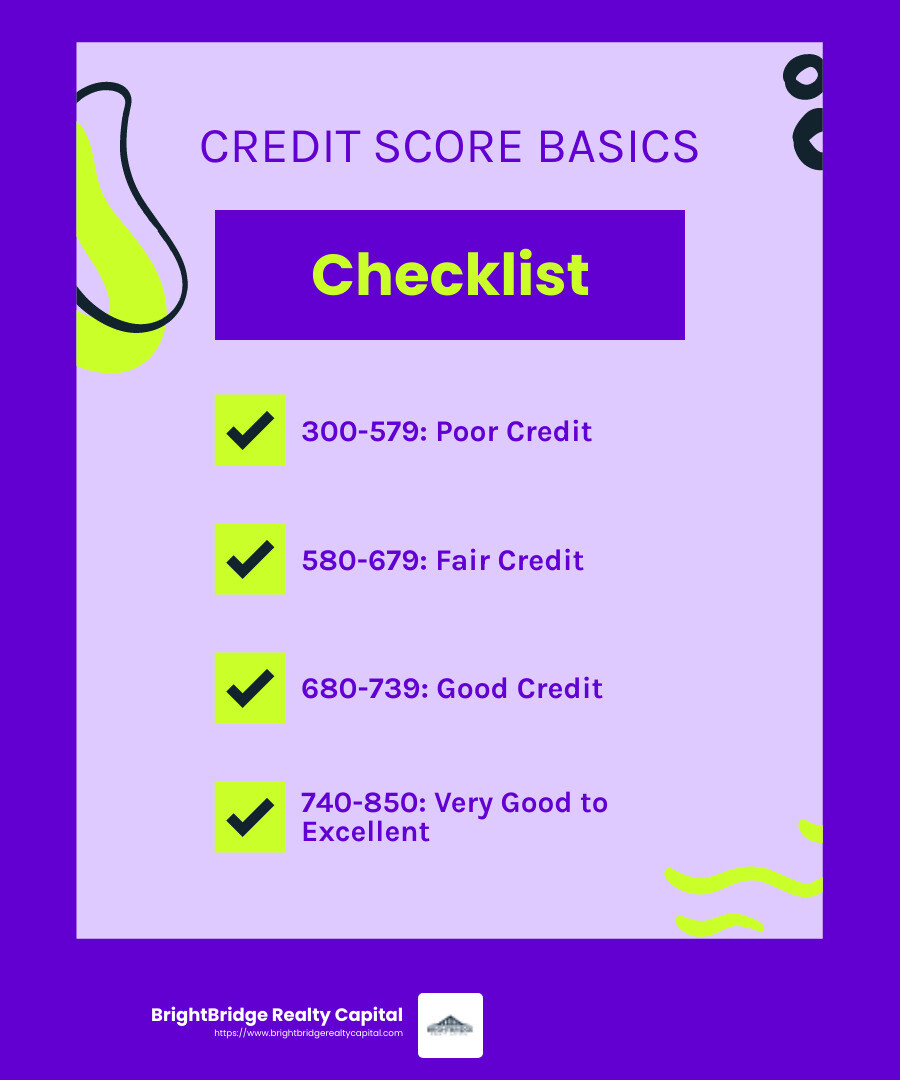Bad Credit? No Problem! Best Mortgage Lenders for You

When it comes to finding a bad credit mortgage lender, many people feel unsure and overwhelmed. But here's the truth: even with bad credit, there are mortgage options available that can help you achieve homeownership. If you're pressed for time, here's a quick guide:
- FHA Loans: Flexible with credit scores as low as 500 with 10% down.
- VA Loans: Perfect for veterans with 0% down and low credit requirements.
- USDA Loans: Ideal for rural areas, offering 100% financing for those with lower credit.
Understanding these options can bring you closer to owning a home, even if your financial past has a few bumps. Keep reading to find out more about how you can steer the mortgage landscape with less-than-perfect credit and secure a loan that suits your needs.

Understanding Bad Credit Mortgages
Navigating mortgages with bad credit can feel like a maze. But fear not! Let's break it down step by step.
Credit Scores: The Basics
Your credit score is a three-digit number ranging from 300 to 850. It acts like a report card for your financial behavior. The higher your score, the more likely you are to get approved for a mortgage with favorable terms. But even if your credit score is on the lower side, there are still options available.
Here's a quick snapshot of credit score ranges:
- 300-579: Poor
- 580-679: Fair
- 680-739: Good
- 740-779: Very Good
- 780-850: Excellent

Loan Eligibility: What Lenders Look For
When you're applying for a mortgage with bad credit, lenders look beyond just your credit score. They assess your overall financial picture, including:
- Income: A stable income can help offset a lower credit score.
- Debt-to-Income Ratio: This is your total monthly debt payments divided by your gross monthly income. A lower ratio is better.
- Payment History: Consistent, on-time payments can boost your chances of approval.
Government-Backed Loans: A Helping Hand
Government-backed loans are often the go-to for people with bad credit. They come with more flexible requirements and can be a lifeline for achieving homeownership. Let's explore the three main types:
FHA Loans: These loans are insured by the Federal Housing Administration. They allow credit scores as low as 500, but you'll need a 10% down payment. With a score of 580 or higher, the down payment drops to 3.5%.
VA Loans: Designed for veterans, these loans offer 0% down and are backed by the Department of Veterans Affairs. They have no minimum credit score requirement, making them accessible for many veterans.
USDA Loans: Perfect for those in rural areas, USDA loans offer 100% financing. They are backed by the U.S. Department of Agriculture and have lower credit score requirements.
Each of these options provides a pathway to homeownership, even if your credit isn't perfect. By understanding your credit score and exploring government-backed loans, you can find a bad credit mortgage lender that fits your needs.
Continue reading to learn about the top bad credit mortgage lenders and how they can help you secure the financing you need.
Top Bad Credit Mortgage Lenders
FHA Loans for Bad Credit
FHA loans are a lifeline for many individuals with low credit scores. Backed by the Federal Housing Administration, these loans are designed to help those who might not qualify for conventional loans.
Here's why FHA loans are a great option:
Low Credit Score Requirement: You can qualify with a credit score as low as 500. If your score is 580 or above, you only need a 3.5% down payment. If it's between 500 and 579, a 10% down payment is required.
Flexible Terms: FHA loans are known for their lenient terms, making them accessible for many first-time homebuyers or those with past financial setbacks.
FHA loans are especially beneficial for those looking to refinance or cash out equity from their home, even with a less-than-perfect credit score.
VA Loans for Veterans
For veterans, VA loans offer an incredible opportunity to purchase a home with favorable terms. These loans are backed by the Department of Veterans Affairs and come with several perks:
No Down Payment: One of the most attractive features of VA loans is the 0% down payment requirement. This makes homeownership more accessible for veterans who may not have significant savings.
No Mortgage Insurance: Unlike other loan types, VA loans do not require private mortgage insurance (PMI), which can save borrowers a significant amount of money over the life of the loan.
Flexible Credit Requirements: While there's no official minimum credit score, many lenders will accept scores as low as 580.
VA loans are an excellent choice for veterans looking to buy or refinance a home, offering both financial benefits and flexibility.
USDA Loans for Rural Areas
For those living in rural areas, USDA loans provide a fantastic opportunity to achieve homeownership with little to no upfront cost. These loans are backed by the U.S. Department of Agriculture and offer:
100% Financing: USDA loans allow for 100% financing, meaning no down payment is required. This is ideal for buyers who may not have the cash for a down payment but have steady income and a decent credit history.
Lower Credit Score Requirements: While specific requirements can vary, many lenders accept credit scores starting at 580, making these loans accessible to a broader range of borrowers.
Rural Focus: USDA loans are specifically designed for rural and suburban areas, helping to promote homeownership in less populated regions.
These loans are perfect for individuals looking to settle in rural communities without the barrier of a large down payment.
By understanding these options, you can find the right path to homeownership, even with a low credit score. Each of these loans offers unique benefits custom to different needs, making them excellent choices for finding a bad credit mortgage lender that suits your situation.
How to Choose the Best Bad Credit Mortgage Lender
Choosing the right bad credit mortgage lender is crucial to ensure you get the best deal possible. Here are some key factors to consider:
Interest Rates
Interest rates can significantly impact the overall cost of your mortgage. Even a small difference in rates can add up over time. When evaluating lenders, compare the annual percentage rates (APR) they offer. If you have bad credit, you may face higher rates, but shopping around can help you find the best available option. Many lenders allow you to apply online for personalized rates, making it easier to compare offers.
Loan Terms
Loan terms refer to the length and conditions of your mortgage. Standard terms include 15- and 30-year fixed-rate mortgages, but some lenders offer more flexible options. Look for lenders that offer terms that fit your financial situation and long-term plans. Shorter terms usually mean higher monthly payments but less interest paid over time. Consider lenders that provide custom mortgage options to better suit your needs.
Customer Service
Good customer service can make the mortgage process smoother and less stressful. Choose a lender known for high customer satisfaction scores. It's beneficial to work with lenders that offer support throughout the loan process, whether through online resources or dedicated loan officers. High-quality customer service can greatly enhance your experience and provide peace of mind.
By focusing on these factors—interest rates, loan terms, and customer service—you can find a bad credit mortgage lender that meets your needs. This careful consideration can help you secure a mortgage that supports your journey to homeownership, even with a less-than-perfect credit score.
Frequently Asked Questions about Bad Credit Mortgage Lenders
What is the minimum credit score for a bad credit mortgage?
When it comes to bad credit mortgages, the minimum credit score can vary depending on the type of loan and the lender. Generally, FHA loans are popular among borrowers with low credit scores, with a minimum requirement as low as 500. However, if your score is between 500 and 579, you may need a higher down payment of at least 10%. For scores of 580 and above, the down payment requirement is typically 3.5%.
VA loans and USDA loans also accommodate lower credit scores, often starting at 580, with the added benefit of no down payment for eligible borrowers. That while these are typical requirements, each lender may have its own criteria.
Can I refinance with bad credit?
Yes, refinancing with bad credit is possible, but it might come with challenges. If you've built up equity in your home, you might qualify for a cash-out refinance to consolidate debts or lower your interest rate. FHA Streamline Refinance is another option, which allows existing FHA loan holders to refinance without a full credit check, though this generally requires timely mortgage payments.
Refinancing with bad credit might lead to higher interest rates. However, it can still be a strategic move if it reduces your overall monthly payments or helps you switch from an adjustable-rate mortgage to a fixed-rate one.
How can I improve my chances of getting approved?
Improving your credit score is one of the best ways to improve your eligibility for a mortgage. Here are some steps you can take:
Pay Bills on Time: Your payment history accounts for 35% of your credit score. Set up autopay to avoid missed payments.
Reduce Debt: Lowering your debt-to-income ratio can make you more attractive to lenders. Aim to keep your credit utilization below 30%.
Check for Errors: Regularly review your credit reports for inaccuracies. According to a study, 44% of consumers have found errors in their credit reports. Correcting these can potentially improve your score.
Avoid New Credit Inquiries: Each hard inquiry can slightly lower your score. Avoid opening new credit lines in the months leading up to your mortgage application.
Consider a Cosigner: If your credit is still a concern, a cosigner with a strong credit history can help you secure a mortgage.
By following these steps, you can improve your financial management and increase your chances of getting approved for a mortgage, even with a less-than-perfect credit score.

Conclusion
Navigating mortgages with bad credit can be daunting, but it doesn't have to be. At BrightBridge Realty Capital, we are committed to making the process as smooth and efficient as possible for you. Our fast closings, often within a week, and flexible funding options are designed to help you seize opportunities without delay.
We understand that every financial situation is unique. That's why we offer customized real estate financing solutions custom to meet your specific needs. Our direct lending approach eliminates intermediaries, providing you with competitive rates and a seamless experience from start to finish.
Whether you're looking to purchase your first home or refinance an existing mortgage, our team is here to guide you every step of the way. With our expertise, you can secure the funding you need and move forward with confidence.
Ready to explore your options? Visit BrightBridge Realty Capital today to learn more about how we can help you achieve your homeownership dreams, even with bad credit.
Your new home and financial future await!


